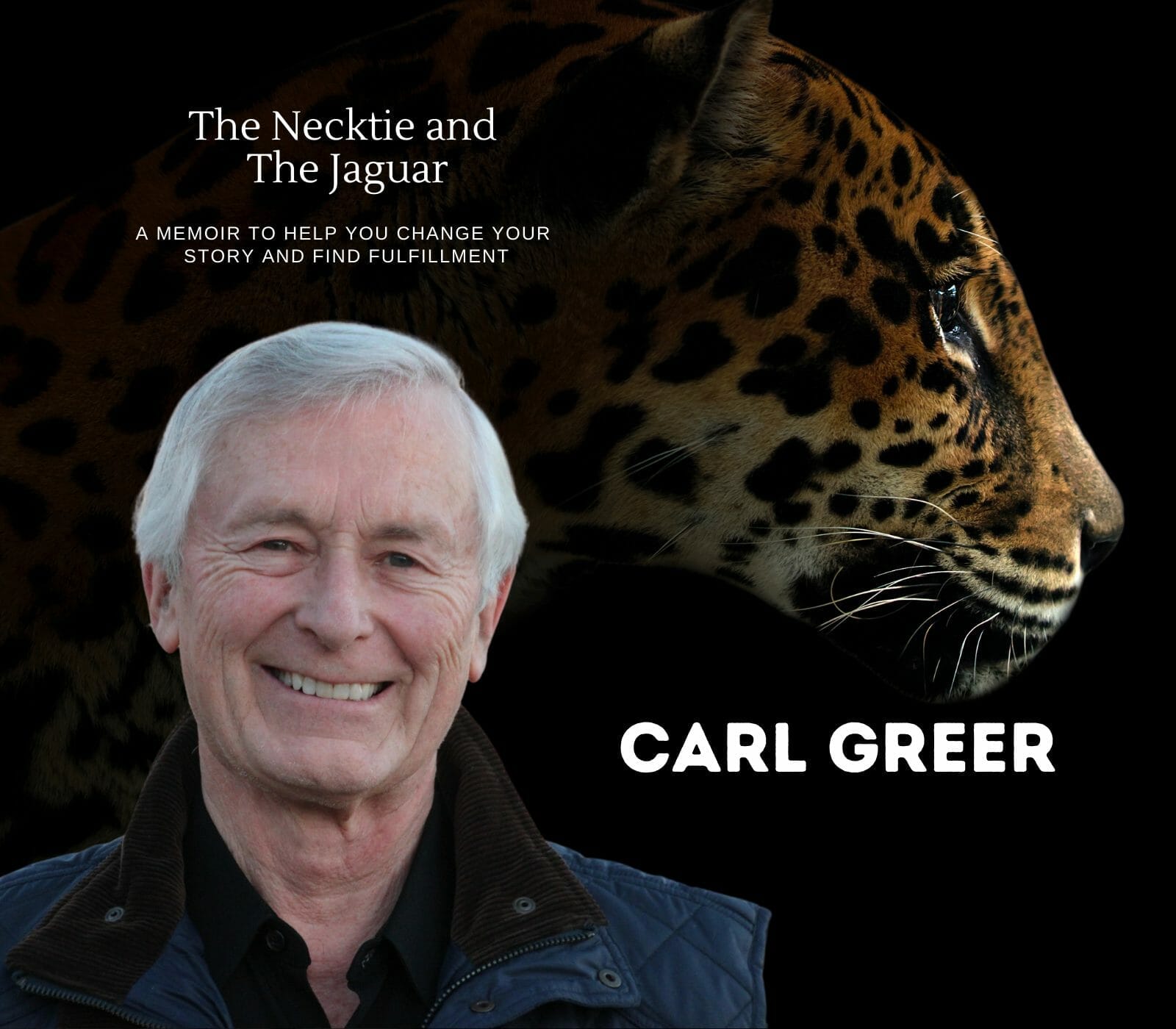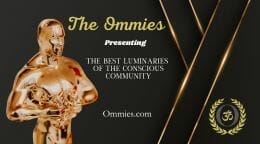Carl Greer: The Necktie and the Jaguar

In his best-selling and award-winning books, Change Your Story, Change Your Life and Change the Story of Your Health, retired Clinical Psychologist and Jungian analyst, businessman, Shamanic practitioner, author, and philanthropist Carl Greer share Shamanic and Jungian Tools to help achieve personal transformation and healing. In his latest book, The Necktie and the Jaguar: A Memoir to Help You Change Your Story and Find Fulfillment, Carl Greer shares his own journey of transformation from post-war mid-western, middle-class upbringing tainted by a childhood tragedy that taught him to constrict his emotions, to career success and wealth as the President of an independent oil and gas company to mid-life, when he recognized that his spiritual self was crying out for nourishment and expression and what he did to actually transform that story and create a bigger, more fulfilling, life for himself.
An Interview with Carl Greer – The Necktie and the Jaguar
Interview by Sandra Sedgbeer
Sandra Sedgbeer: Carl, your book The Necktie and the Jaguar, is an unusual kind of memoir inasmuch as you’ve taken reader engagement to another level by including thought-provoking questions at the end of each chapter related to the experiences and insights you’ve shared that encourage us to ask questions about our own lives so we too might breakthrough from old patterns and live according to the needs of our soul. Was there something particular that inspired you to construct your book that way, or was it just a case that even in retirement from one’s practices as a Jungian analyst and shaman, you’ve never really stopped being a teacher, guide, and practitioner?
Carl Greer: Probably a little bit of both. In my other two books, I posed questions for readers to use to help their process about some of the material in the book. I didn’t intend to do that in this book, but after I finished it, I thought maybe some of the themes that were up for me in my life might be up for others too. And perhaps I could pose questions that might be helpful when reflecting on their own journey. So that’s how it came about.
Sandra Sedgbeer: Your story, like so many of our stories, is about seeking meaning and fulfillment in your life and knowledge in what you refer to as your mythopoetic self. What do you mean by “mythopoetic self”?
Carl Greer: For me, it’s that part of me that has a spiritual component, it’s soulful, it isn’t practical necessarily, but it’s something I yearn for and have stifled for a lot of my life. So it’s this part I was seeking that would give me more meaning and a deeper spiritual connection.
Sandra Sedgbeer: I’ve heard people talk about mythic stories, mythic lives, but I’ve never heard anybody use the word mythopoetic, but I think you’ve summed it up very well there because we all do have that yearning inside us. It doesn’t matter how successful we are, and you were very successful. Still, there is that something that we often say, well, I’ve got this, and I’ve achieved that ambition, but still, I don’t feel that I’m fully there. I haven’t got to the thing that will give me fulfillment, and I think the mythopoetic self is a perfect word to describe that.
Carl Greer: When I was thinking about what I wanted to do in college, as a 17-18-year-old, what course to take, that word ‘mythopoetic’ came to me somehow. I wanted to take a course that would burn out that mythopoetic part of me because I didn’t think it would be practical or helpful for my life. And that’s one of the reasons I took engineering, which I wasn’t necessarily that crazy about. I thought it would be practical and give me good training, but clearly not further my desire to explore my mythopoetic side.
Sandra Sedgbeer: In the book, you write about the importance of service to others. Is that something that was part of your consciousness even as you were climbing the ladder to become President of the oil and gas company, making complex business decisions designed to increase profitability and success, or was that something that only began to reemerge for you later on once you started listening to your ‘mythopoetic self’?
Carl Greer: It was later on in life. The first part of my life was more about accomplishment and achievement. I didn’t have a lot of time to think about the other things. They became more important as I got older and made changes in my life.
Sandra Sedgbeer: So tell us how those changes came about and how they impacted you.
Carl Greer: In my mid-40s, I decided I wanted to explore an interest I‘d had years earlier in psychology, so I ended up going back to graduate school. It took me eight years, and I got a Ph.D. in Clinical Psychology and started seeing clients. That process, plus the desire to become a Jungian Analyst, led me to analyze myself and found out many things that I’d blocked from my consciousness that were getting in my way. So it was a whole personal journey for me to reach parts of myself. That was the start of my opening to other energies and experiences I’d not had up until that time.
Sandra Sedgbeer: What drew you to Jungian psychology in particular?
Carl Greer: When I decided to become a psychologist, I wanted to explore which branch of psychology I ultimately wanted to study, so I went to different schools around Chicago, Adlerian school, Freudian and Jungian Schools, and I seemed to be more Sympatico with Jungian psychology, which I also associated with stories, fairy tales, and myths, which I’d enjoyed as a kid. It wasn’t necessarily the most rational reason, just my feelings.
Sandra Sedgbeer: But you so wanted to become a Jungian psychologist that you spent more years in the study than you might’ve done with another type of psychology, indeed?
Carl Greer: Definitely. I was still working and trying to keep the rest of my life together. It took eight years to get my degree in clinical psychology and then another five years to become a Jungian Analyst, so I had 13 years of school to fit into my life.
Sandra Sedgbeer: That’s a long time. What kept you going through that long slog?
Carl Greer: I was really feeding my soul. I mean, the training and whatnot were meaningful to me, and it fed me. For other reasons, my business life was coming to a close as some of the things I said I’d do were done, and the industries I was in charge, so it was all coming together. I had more time to explore these things that were important to me.
Sandra Sedgbeer: You say that now you are amused at how very logical you were about starting analysis and how little awareness you had for the need to reflect on your shadow qualities.
Carl Greer: I thought I’d just sit in front of somebody, and we’d talk. I thought that was just a means to an end. I had no idea that there were parts of myself that had been shut off and blocked and pretty heavily defended that I didn’t even want to look at. It was a very, very valuable process for me, and it took me a while to really own the value. Once I did, I tried to be aware of what I needed to do as I could be and open with the process.
Sandra Sedgbeer: I think most of us say we want to change, but once we start looking at the shadow side of ourselves, many of us run away. We don’t want to go there. It’s too painful. The ego does not want to be stripped apart.
Carl Greer: Absolutely. It’s one of the things I’ve thought about and written about. If people want to change their lives, they have to change their story, but the first step is to be really honest about your story and not tell yourself the story that others have told you or the one you want to hear. The analysis helped me find out what my true story was.
Sandra Sedgbeer: A significant discovery for you was that you needed to work on your relationship to the archetypal feminine energy, your internal, unconscious relationship to women. How surprising and uncomfortable was that for you?
Continue to Page 2 of the Interview with Carl Greer
A veteran broadcaster, author, and media consultant, Sandie Sedgbeer brings her incisive interviewing style to a brand new series of radio programs, What Is Going OM on OMTimes Radio, showcasing the world’s leading thinkers, scientists, authors, educators and parenting experts whose ideas are at the cutting edge. A professional journalist who cut her teeth in the ultra-competitive world of British newspapers and magazines, Sandie has interviewed a wide range of personalities from authors, scientists, celebrities, spiritual teachers, and politicians.










